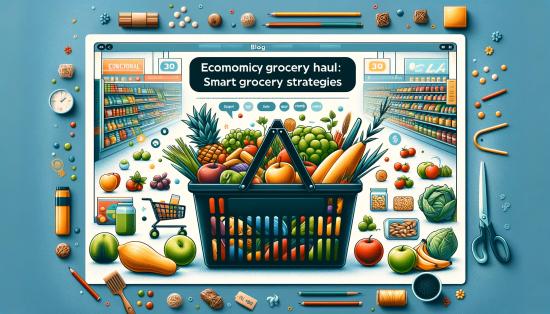
Economical Grocery Haul: Smart Shopping Strategies
Discover savvy strategies for economical grocery shopping and budget-friendly meal planning to save money and make smarter choices.
Introduction to cost-effective grocery shopping and its benefits. In today's economy, it's more important than ever to be mindful of our spending habits, including our grocery shopping. Cost-effective grocery shopping is not only about saving money but also about making smart choices that can benefit your health and the environment. By being strategic with your grocery shopping, you can reduce food waste, support local businesses, and make healthier choices for you and your family. In this blog/tutorial, we will explore a variety of strategies to help you become a savvy grocery shopper and reap the rewards of your efforts. Whether you're a budget-conscious college student or a savvy parent looking to stretch your dollar, these cost-effective grocery shopping tips will be a valuable resource for you and your family.
Before heading to the grocery store, it's essential to have a meal plan in place. Meal planning helps you to avoid impulse purchases and ensures that you only buy the items you really need. By taking the time to plan your meals for the week, you can also make a shopping list that includes all the necessary ingredients, which saves you time and prevents you from forgetting essential items. Additionally, meal planning allows you to make healthier food choices by focusing on balanced and nutritious meals. It also helps in reducing food waste as you only buy what you need, leading to cost savings. Having a meal plan in place before heading to the store is an essential step in maintaining a cost-effective grocery shopping habit.
Creating a categorized shopping list can be a game-changer when it comes to saving time and money during grocery shopping. By organizing your list based on different categories such as produce, dairy, meat, grains, and pantry staples, you can streamline your shopping process and avoid making multiple trips to the same aisle. This method also helps in preventing impulse purchases as you are focused on purchasing only the items on your list. Additionally, having a well-organized shopping list allows you to keep track of the items you already have at home, preventing you from overbuying and wasting food. When you stick to your list and avoid unnecessary purchases, you can save a significant amount of money on your grocery bill. Furthermore, a categorized list can assist in identifying the best deals and comparing prices across different brands and products, ensuring that you are getting the most value for your money.
When comparing prices at the grocery store, it's essential to understand unit pricing to ensure you're getting the best deal. Always check the price per unit on the shelf label to compare prices accurately across different brands and package sizes. This allows you to see the true cost of the product and make informed decisions about which option offers the best value. Additionally, pay attention to any special promotions or bulk deals that may be available, as these can affect the unit price and overall savings. Don't forget to consider the quality and shelf life of the product when making your decision. Being mindful of unit pricing and taking advantage of promotions can lead to significant savings on your grocery bill without sacrificing quality.
When it comes to saving money on groceries, one of the most effective strategies is to buy in-season produce. Seasonal fruits and vegetables are not only fresher and tastier but also more affordable. By purchasing produce that is in-season, you can take advantage of abundance and lower production costs, resulting in significant savings on your grocery bill. Furthermore, in-season produce tends to be more nutrient-dense, making it a healthier choice for you and your family. One helpful tip for maximizing savings is to do some research on what fruits and vegetables are in season in your area before heading to the grocery store. By planning your meals around in-season produce, you can cut down on costs and make the most of your grocery budget.
Bulk buying can be a cost-effective way to stock up on essential items and save money in the long run. When you purchase items in bulk, you often receive a lower unit price, which can result in significant savings over time. Additionally, buying in bulk can reduce the frequency of shopping trips, saving you time and gas money. However, bulk buying isn't always the best option. It's important to consider the shelf life of the items you're purchasing and whether you'll realistically use them before they expire. In some cases, buying in bulk can lead to food waste if items go bad before you have a chance to consume them. Another drawback is the initial investment required for bulk purchases, which may not be feasible for everyone. Ultimately, the decision to buy in bulk should be based on your household's consumption patterns and storage capabilities.
Utilizing coupons and loyalty programs effectively is a great way to maximize savings on groceries. Many stores offer loyalty programs that provide discounts, personalized offers, and rewards for frequent shoppers. By signing up for these programs, you can save money on items you buy regularly and earn points or cash back that can be used towards future purchases. Additionally, using coupons from newspapers, online sources, or store apps can lead to significant discounts on your grocery bill. It's important to stay organized and keep track of expiration dates and terms for each offer, as well as to only use coupons for items you actually need. With the right approach, leveraging coupons and loyalty programs can result in substantial savings on your grocery haul.
Avoiding impulse purchases with strategic store navigation is essential for maintaining a cost-effective grocery shopping habit. One key strategy is to have a clear plan and stick to it. Before entering the store, take a moment to review your categorized shopping list and mentally map out the route you will take to collect the items. This will prevent you from wandering into aisles that contain items you don't need and decrease the likelihood of making impulse purchases. Another helpful tactic is to avoid shopping when hungry, as this can lead to purchasing unnecessary items that look appealing in the moment. Additionally, consider shopping alone if possible, as shopping with friends or family can increase the chances of deviating from your list. By strategically navigating the store and staying disciplined, you can maximize savings and avoid falling victim to impulse buys.
As technology continues to advance, it has become an invaluable tool for finding the best deals when grocery shopping. With the rise of smartphone apps and websites dedicated to comparing prices and finding coupons, consumers have more resources than ever at their fingertips. These platforms allow users to easily compare prices from different stores, ensuring that they are getting the best deal on their purchases. Additionally, many grocery stores now offer digital coupons that can be easily accessed and redeemed through a smartphone, saving both time and money for shoppers. Furthermore, loyalty programs have gone digital, allowing users to track their points and rewards through dedicated apps. By taking advantage of these technological resources, shoppers can maximize their savings and make informed decisions when it comes to finding the best deals on groceries.
In conclusion, maintaining cost-effective grocery habits is a crucial aspect of managing a household budget. By incorporating meal planning, creating categorized shopping lists, comparing prices, and embracing seasonal shopping, shoppers can maximize their savings without compromising on the quality of their groceries. Understanding when bulk buying is beneficial and utilizing coupons and loyalty programs effectively can further contribute to significant cost savings. Strategic store navigation and leveraging technology to find the best deals are also important tools in the pursuit of economical grocery shopping. By adopting these smart shopping strategies, individuals and families can establish sustainable and budget-friendly grocery habits that positively impact their financial well-being.
Related posts





